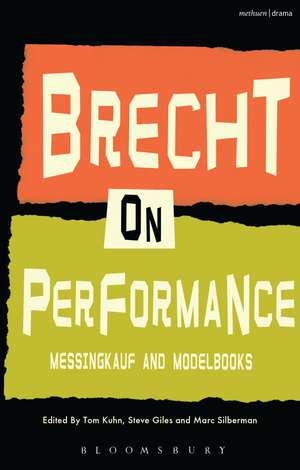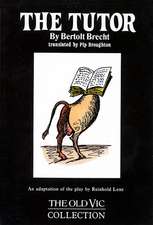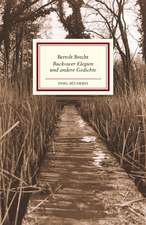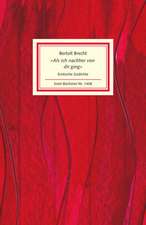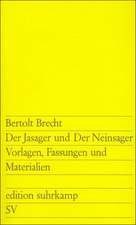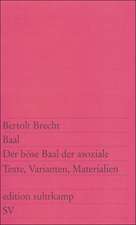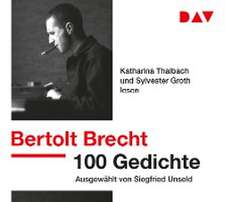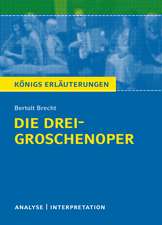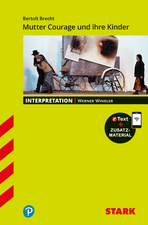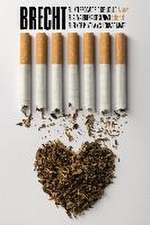Brecht on Performance: Messingkauf and Modelbooks
Autor Bertolt Brecht Editat de Tom Kuhn, Marc Silberman, Prof. Steve Giles Traducere de Charlotte Ryland, John Willett, Romy Furslanden Limba Engleză Hardback – 19 noi 2014
| Toate formatele și edițiile | Preț | Express |
|---|---|---|
| Paperback (2) | 172.61 lei 3-5 săpt. | |
| Bloomsbury Publishing – 17 oct 2018 | 172.61 lei 3-5 săpt. | |
| Bloomsbury Publishing – 19 noi 2014 | 238.43 lei 3-5 săpt. | |
| Hardback (1) | 736.49 lei 6-8 săpt. | |
| Bloomsbury Publishing – 19 noi 2014 | 736.49 lei 6-8 săpt. |
Preț: 736.49 lei
Preț vechi: 990.39 lei
-26% Nou
Puncte Express: 1105
Preț estimativ în valută:
130.33€ • 152.82$ • 114.45£
130.33€ • 152.82$ • 114.45£
Carte tipărită la comandă
Livrare economică 04-18 februarie 26
Preluare comenzi: 021 569.72.76
Specificații
ISBN-13: 9781472558602
ISBN-10: 147255860X
Pagini: 312
Ilustrații: 50 bw illus
Dimensiuni: 138 x 216 x 23 mm
Greutate: 0.52 kg
Editura: Bloomsbury Publishing
Colecția Methuen Drama
Locul publicării:London, United Kingdom
ISBN-10: 147255860X
Pagini: 312
Ilustrații: 50 bw illus
Dimensiuni: 138 x 216 x 23 mm
Greutate: 0.52 kg
Editura: Bloomsbury Publishing
Colecția Methuen Drama
Locul publicării:London, United Kingdom
Caracteristici
Features practical application of the texts by internationally renowned theatre director and teacher Di Trevis.
Notă biografică
Bertolt Brecht (1898-1956) is acknowledged as one of the great dramatists whose plays, work with the Berliner Ensemble and writing have had a considerable influence on the theatre. His landmark plays include The Threepenny Opera and, while exiled from Germany and living in the USA, such masterpieces as The Life of Galileo, Mother Courage and The Caucasian Chalk Circle.
Recenzii
Brecht on Performance is a companion volume and has two parts. The first is an overhaul of what Willett previously called the Messingkauf Dialogues. 'Buying Brass' - the more literal translation of Messingkauf - assembles more of the fragmentary material and includes Brecht's 'Practice Pieces for Actors', revealing that the 'dialogues' were only one, albeit major, element in the overall project. The editing of the fragments is exemplary . The second part includes writings and images from three of Brecht's 'modelbooks', as well as essays from the Berliner Ensemble's documentation Theatre Work and the 'Katzgraben' Notes. Taken together, the extracts presented here form a rich collection that includes significant work from when Brecht returned to theatre-making in 1948. These two volumes represent an excellent extension of Brecht's writings in English. The editors draw on contemporary scholarship, apply high editorial standards, and offer a readability that opens up Brecht's theories and practices for a new generation.
An excellent complement to Brecht in Practice. . These theoretical essays concern the practice of theatre (known as Messingkauf, or "buying brass") and explore the way actors should interpret and perform a text.
Combined with Brecht in Practice, [Brecht on Performance] makes a compelling contribution to the anglophone understanding of Brecht and may indeed breathe new life into how we do theatre in the twenty-first century.
Brecht in Performance is the ideal and long-awaited companion to the much loved, but now greatly improved Brecht on Theatre. Essential reading for students, theatre practitioners and anyone interested in this hugely important figure.
This is a book at least as essential as Brecht on Theatre, not least because it restores to print a carefully reconstructed version of Brecht's major theoretical work The Messingkauf Dialogues (first released in English by Willett in 1965), with many variant texts absent from the first publication of that treatise. . It is unnecessary to qualify my praise for the other major element of Brecht on Performance, and that is a fresh, lushly illustrated translation of three of Brecht's modelbooks, created for the Berliner Ensemble during the brief period that Brecht was at its helm.
Brecht on Performance is a vital aid to English speakers in understanding Brecht as a theatre practitioner as well as what constitutes Brechtian performance. For the first time, a full edition of the unfinished Messingkauf - translated as Buying Brass - is available in English. [This book] will allow Anglophone scholars and performance practitioners to revisit Brecht's influence as a writer, theoretician, and theatre maker specifically, but also - more generally - the relationship between political thought and aesthetics, and between the theory and the practice of making art.
An excellent complement to Brecht in Practice. . These theoretical essays concern the practice of theatre (known as Messingkauf, or "buying brass") and explore the way actors should interpret and perform a text.
Combined with Brecht in Practice, [Brecht on Performance] makes a compelling contribution to the anglophone understanding of Brecht and may indeed breathe new life into how we do theatre in the twenty-first century.
Brecht in Performance is the ideal and long-awaited companion to the much loved, but now greatly improved Brecht on Theatre. Essential reading for students, theatre practitioners and anyone interested in this hugely important figure.
This is a book at least as essential as Brecht on Theatre, not least because it restores to print a carefully reconstructed version of Brecht's major theoretical work The Messingkauf Dialogues (first released in English by Willett in 1965), with many variant texts absent from the first publication of that treatise. . It is unnecessary to qualify my praise for the other major element of Brecht on Performance, and that is a fresh, lushly illustrated translation of three of Brecht's modelbooks, created for the Berliner Ensemble during the brief period that Brecht was at its helm.
Brecht on Performance is a vital aid to English speakers in understanding Brecht as a theatre practitioner as well as what constitutes Brechtian performance. For the first time, a full edition of the unfinished Messingkauf - translated as Buying Brass - is available in English. [This book] will allow Anglophone scholars and performance practitioners to revisit Brecht's influence as a writer, theoretician, and theatre maker specifically, but also - more generally - the relationship between political thought and aesthetics, and between the theory and the practice of making art.
Cuprins
General Introduction and AcknowledgementsPart One - The Messingkauf, or Buying BrassIntroduction to Buying BrassPreambleFirst Night(i) Setting the Scene(ii) Naturalism, Realism, Empathy(iii) Tragedy; Learning, Science, MarxismSecond Night(i) Intoxication, Empathy, V-effect(ii) Acting, Performance(iii) Science, Social Class, Learning(iv) Elizabethan Theatre, Shakespeare(v) The Augsburger, PiscatorThird Night(i) The Fourth Wall, Emotion; V-effect, Acting(ii) The Augsburger, Piscator, Weigel(iii) Social Science and Art(iv) 'Extreme Situations'Fourth Night(i) The Nature of Art(ii) Emotion, Critique, Representation (iii) The Augsburger (iv) Shakespeare(v) FinaleMiscellaneous Texts(i) Illusionism, Realism, Naturalism; Social Function of Theatre; Empathy(ii) Acting(iii) Thaëter, Piscator, NeherPlans and Appendices(i) Plans(ii) AppendicesPractice Pieces for Actors(i) Parallel ScenesThe Murder in the Porter's Lodge(Parallel Scene to Shakespeare's Macbeth, Act 2, Scene 2)The Battle of the Fishwives(Parallel to Schiller's Maria Stuart, Act 3)(ii) Intercalary ScenesFerry Scene(To be played between Scenes 3 and 4, Act 4 of Shakespeare's Hamlet)The Servants(To be played between Scenes 1 and 2, Act 2 of Shakespeare's Romeo and Juliet)(iii) Circular PoemsPart Two - ModelbooksIntroduction to the ModelbooksOn Life of Galileo (1947/48) from Constructing a Role: Laughton's GalileoForewordA Sequence from Scene One: Rotation of the Earth and Rotation of the BrainBackground to the Performance On The Antigone of Sophocles (1947/48) from Antigone Model 1948ForewordRuth Berlau's Prefatory NotePrelude and Bridge to Scene OneNeher's Second Design for the Antigone StageOn Mother Courage and Her Children (1949/50/51) from Courage Model 1949Opening RemarksNotes and Scene-Photos for the Prologue, Scenes One and TwoDetails from Scene ThreeVariations in Berlin and MunichConcluding Texts from the Model: Scene Twelve From Theatre Work (1952)Some Remarks on My DisciplineBertolt Brecht's Stage DirectionPhases of a Stage DirectionFive Notes on ActingThe Berliner Ensemble ModelsTheatre PhotographyDoes Use of the Model Restrict Artistic FreedomHow Erich Engel Uses the ModelHow the Director Brecht Uses His Own ModelFrom the Correspondence of the Berliner Ensemble about the ModelCreative Evaluation of ModelsFrom Katzgraben Notes 1953Epic TheatreRehearsal MethodsSceneryCrises and ConflictsPolitics in the TheatreIII,2 Constructing a HeroIs Katzgraben a Proselytizing Play?The Verse FormVerfremdungII, 3 [Revelation and Justification]EmpathyThe New Farmer, the Medium Farmer, the Big FarmerWhat Are Our Actors Actually Doing?The Positive HeroSecond Dress RehearsalCriticism of Elli and Criticism of Elli 2New Content - New FormDi Trevis: "Acting is Not Theoretical"Select BibliographyIndex of Names and Key Terms
